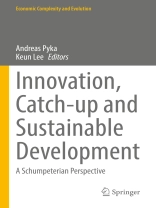This volume presents selected contributions from the 2018 conference of the International Schumpeter Society (ISS). The selected chapters in this volume reflect the state-of-the-art of Schumpeterian economics dedicated to the three conference topics innovation, catch-up, and sustainability. Innovation is driving catch-up processes and is the condition for a transformation towards higher degrees of sustainability. Therefore, Schumpeterian economics has to play a key role in these most challenging fields of human societies’ development in the 21st century. The three topics are well suited to capture the great variety of issues, which have the potential to shape the scientific discussion in economics and related disciplines in the years to come.
The presented contributions show the broadness and high standard of Schumpeterian analysis. The ideas of dynamics, heterogeneity, novelty, and innovation as well as transformation are the most attractive fields in economics today and offer the most prolific interdisciplinary connections now and for the years to come when humankind, our global society, has to master the transition towards sustainable economic systems by solving the grand challenges and wicked problems with which we are confronted today.
Therefore, the book is a must-read for scholars, researchers, and students, interested in a better understanding of innovation, catch-up, and sustainability, and Schumpeterian economics in general.
The chapter “Industrial life cycle: relevance of national markets in the development of new industries for energy technologies – the case of wind energy” is available open access under a CC BY 4.0 License via link.springer.com.
Cuprins
Innovation, Catch-up and Sustainable Development.- PART I INNOVATION.- The Influence of Science and ‘Industrial Enlightenment’ on Steelmaking, 1786-1856.- Science and Technology Relatedness: The Case of DNA Nanoscience & DNA Nanotechnology.- Observable Factors of Innovation Strategy: Firm Activities and Industry Effects.- The Value of Industry Studies: Impact of Luigi Orsenigo’s Legacy on the Field of Innovation and Industry Evolution.- PART II CATCHING-UP.- National Innovation Systems, Economic Complexity, and Economic Growth: Country Panel Analysis Using the US Patent Data.- Regulation and Product Innovation: The Intermediate Role of Resource Reallocation.- Catch-Up and Reverse Catch-Up Processes In the Market for Lithium-Ion Batteries.- Drug Patent Protection: A Determinant of the Location of Pharmaceutical FDI.- Total Factor Productivity, Catch-Up and Technological Congruence in Italy, 1861-20101.- Acting as an Innovation Niche Seeder: How Taiwan Helps to Overcome the Reverse Salient in the Southeastern Asia.- Embeddedness and Local Patterns of Innovation: Evidence from Chinese Prefectural Cities.- Patent, Utility Model And Economic Growth.- PART III SUSTAINABILITY.- Schumpeterian Economic Dynamics of Greening: Propagation of Green Eco-Platforms.- Industrial Life Cycle: Relevance of National Markets in the Development of New Industries for Energy Technologies – The Case of Wind Energy.- On Application of the Precautionary Principle to Ban Gmvs: An Evolutionary Model of New Seed Technology Integration.
Despre autor
Andreas Pyka is a Professor of Economics and holds the chair of innovation economics at the Business and Economics Faculty of the University of Stuttgart-Hohenheim, Germany. He has degrees in management sciences and economics (University of Augsburg) and he received his Ph.D. from the University of Augsburg. His main fields of research are industrial dynamics, Neo-Schumpeterian economics, and innovation networks drawing on numerical approaches, in particular agent-based modeling.
Keun Lee is a Professor of Economics at the Seoul National University, Republic of Korea, and the winner of the 2014 Schumpeter Prize. He served as the President of the International Schumpeter Society (2016-18), is a member of the Committee for Development Policy of UN (2014-18), and a council member of the World Economic Forum since 2016. He obtained his Ph.D. in economics from the University of California, Berkeley.












